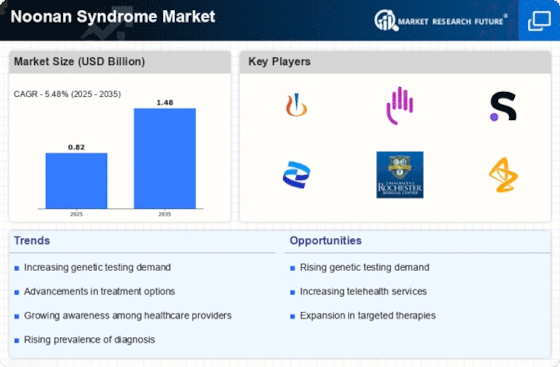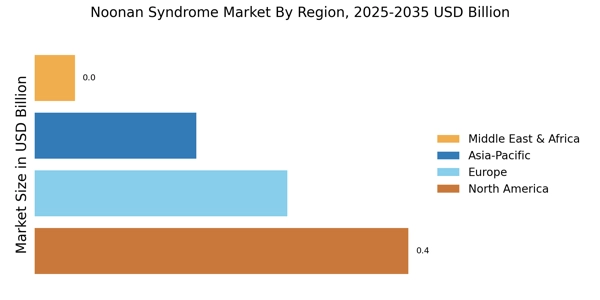Advancements in Genetic Testing
The Noonan Syndrome Market is experiencing a notable surge due to advancements in genetic testing technologies. Enhanced diagnostic tools, such as next-generation sequencing, have improved the accuracy of identifying Noonan Syndrome Market, which is crucial for early intervention. As a result, the demand for genetic testing services is on the rise, with the market projected to grow significantly. According to recent estimates, the genetic testing segment within the Noonan Syndrome Market is expected to expand at a compound annual growth rate of over 10% in the coming years. This growth is driven by the increasing prevalence of genetic disorders and the need for precise diagnosis, which ultimately leads to better patient outcomes.
Rising Incidence of Noonan Syndrome
The incidence of Noonan Syndrome Market appears to be on the rise, contributing to the expansion of the Noonan Syndrome Market. Recent epidemiological studies suggest that the prevalence of this genetic disorder may be higher than previously estimated, leading to increased demand for diagnostic and therapeutic solutions. As awareness of Noonan Syndrome Market grows among healthcare professionals and the general public, more individuals are likely to seek diagnosis and treatment. This trend is expected to drive market growth, as healthcare systems adapt to accommodate the needs of affected individuals. The rising incidence of Noonan Syndrome Market is a critical factor influencing the dynamics of the Noonan Syndrome Market.
Regulatory Support for Treatment Approvals
Regulatory bodies are increasingly recognizing the need for expedited approval processes for treatments targeting rare genetic disorders, including Noonan Syndrome Market. This trend is evident in the Noonan Syndrome Market, where regulatory agencies are implementing frameworks that facilitate faster access to innovative therapies. The introduction of orphan drug designations and priority review pathways is likely to encourage pharmaceutical companies to invest in the development of treatments for Noonan Syndrome Market. As a result, the market may witness a surge in new product launches, which could significantly enhance treatment options available to patients. This regulatory support is expected to drive growth within the Noonan Syndrome Market.
Growing Investment in Rare Disease Research
Investment in research focused on rare diseases, including Noonan Syndrome Market, is gaining momentum within the Noonan Syndrome Market. Pharmaceutical companies and research institutions are allocating substantial resources to develop targeted therapies and innovative treatment options. This trend is likely to enhance the understanding of Noonan Syndrome Market and facilitate the discovery of effective interventions. Recent funding reports indicate that investments in rare disease research have increased by approximately 15% annually, reflecting a growing recognition of the unmet medical needs in this area. As more stakeholders engage in research initiatives, the potential for breakthroughs in treatment options for Noonan Syndrome Market appears promising.
Increased Patient Advocacy and Support Groups
The Noonan Syndrome Market is benefiting from the rise of patient advocacy and support groups that aim to raise awareness about the condition. These organizations play a pivotal role in educating the public and healthcare professionals about Noonan Syndrome Market, thereby fostering a more informed community. The presence of these groups has been linked to increased funding for research and improved access to care for patients. Furthermore, the collaboration between advocacy groups and healthcare providers is likely to enhance the overall support system for individuals affected by Noonan Syndrome Market. This growing network of support is expected to positively influence the Noonan Syndrome Market by driving demand for specialized services and therapies.

















